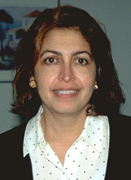After a promotion to associate professor of civil and environmental engineering and an appointment to editor-in-chief of the Bioremediation journal, Hanadi S. Rifai can now add another honor to her list of recent achievements. The Texas Natural Resource Conservation Commission (TNRCC) has awarded Rifai a $3.2 million grant to study dioxin in the Houston Ship Channel.
"This is something I've been working on for quite a while," Rifai said. "I'm delighted that it actually happened. I think this is going to be a big program for us here in the department."
Rifai's research will help to improve the health of Houston's residents. The dioxin found in seafood organism tissue can affect human health, even at low concentrations. Due to elevated dioxin levels, the Texas Department of Health issued a seafood consumption advisory for catfish and blue crabs in September 1990 for the upper portion of Galveston Bay and the Houston Ship Channel (HSC). As a result, the HSC system was placed on a list of water bodies that violate water quality standards.
Rifai hopes to attract high-quality students to work on the project, which will focus on locating dioxin sources and developing load allocation strategies to reduce the dioxin output. The practice of bleaching paper with chlorine is believed to be a former source of dioxin, and current potential sources include the pulp and paper industry, medical waste incineration, PVC production, petroleum refining, and wastewater effluent and reservoir sources. In order to determine the dioxin sources, Rifai will monitor and conduct sampling of ambient water, sediments, tissue, sludges, effluents, air emissions, wet/dry deposition from air and runoff.
As co-author of three books, eleven book chapters, and several software manuals, and author of numerous articles and editorials, Rifai possesses extensive experience and knowledge in the environmental engineering field. Her expertise and research interests include hydrology, hazardous waste, groundwater flow and transport modeling, urban storm water quality, natural attenuation and non-point source pollution.
Rifai also studies floodplain management, risk assessment, Decision Support Systems and Geographic Information Systems (GIS). Rifai built and manages the GIS computer laboratory in the Cullen College of Engineering. She also authored the BIOPLUME II and BIOPLUME III computer models for biodegradation and natural attenuation modeling.
After earning her bachelor's degree in civil engineering from the American University of Beirut, Lebanon, in 1982, Rifai moved to Houston and graduated from Rice University in 1989 with a master's degree and a doctorate in environmental engineering. She won the 1989 Ralph Budd Award for Best Dissertation in Engineering. Following graduation, Rifai worked at Rice as a research associate and then as an adjunct assistant professor. She held the position of faculty fellow in Rice's Department of Environmental Science and Engineering and served as executive director of the Energy and Environmental Systems Institute.
In 1997 she arrived at the University of Houston as an assistant professor of civil and environmental engineering. Rifai is now an associate professor in the Department of Civil and Environmental Engineering. In addition to working on the research project for the TNRCC, Rifai is also involved with eight other projects for, among others, the Air Force Center for Environmental Excellence, the Texas Advanced Technology Program and the Gulf Coast Hazardous Substance Research Center.
Rifai has completed 17 environmental engineering research projects in the last decade. Her dedication to researching the mysteries of the world's most valuable natural resource began at a young age in Beirut, on the coast of the Mediterranean Sea.
"I grew up near water," Rifai said. "I always knew I wanted to study what goes on in the water."
